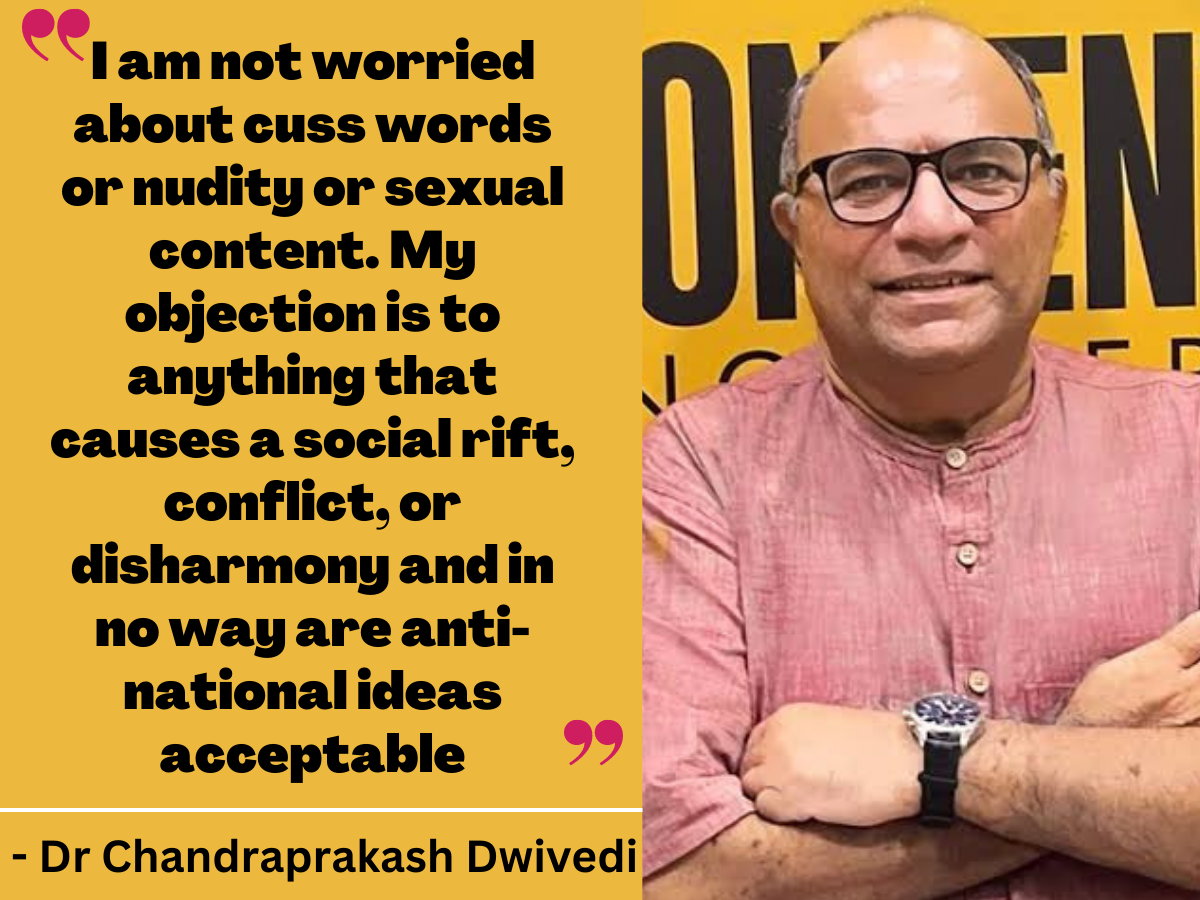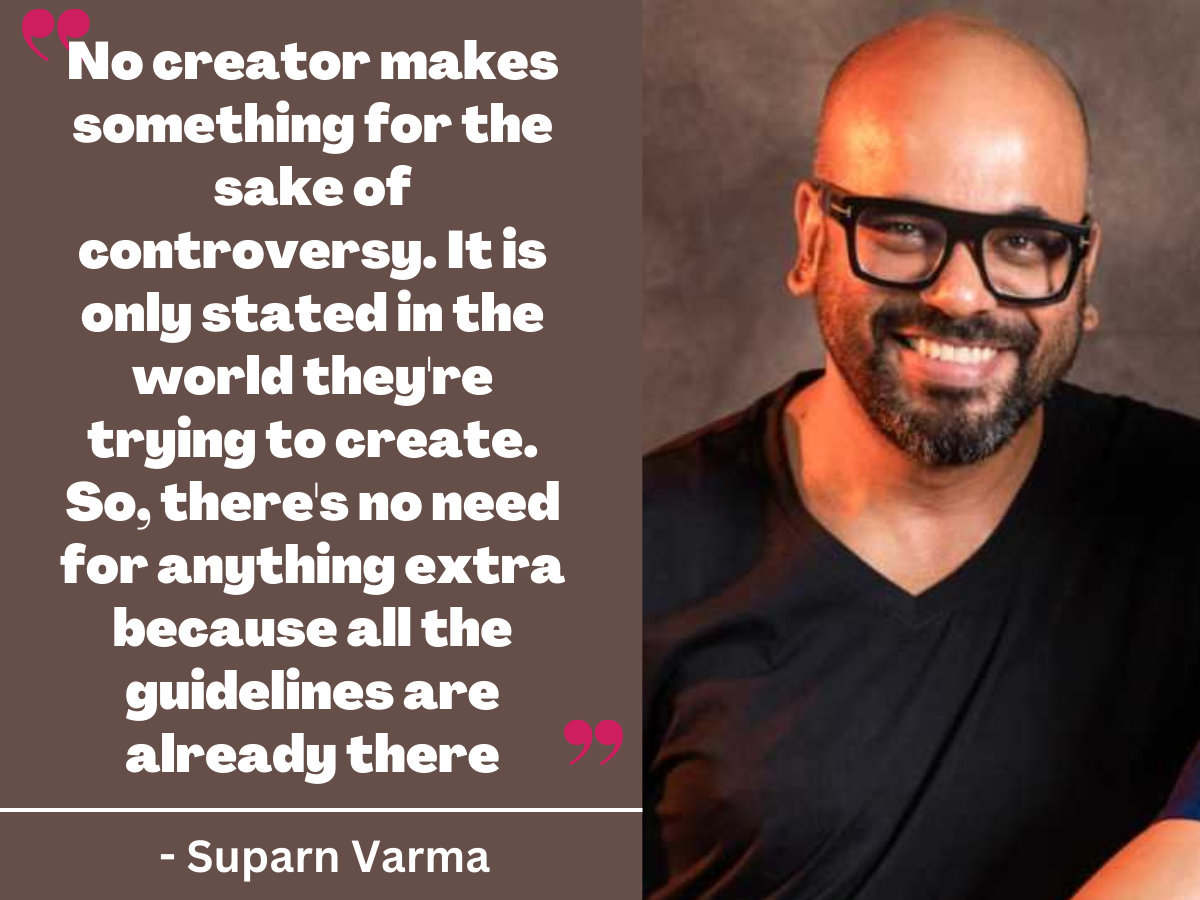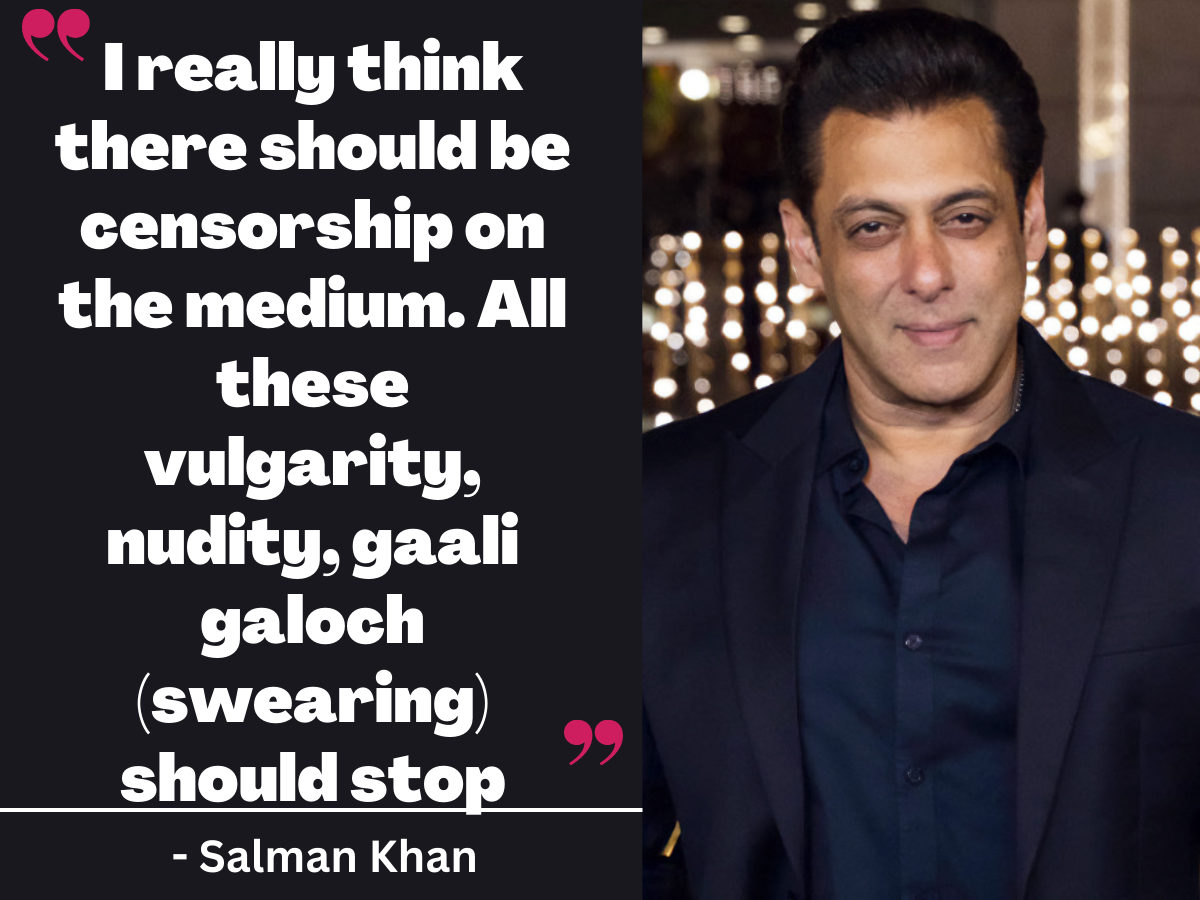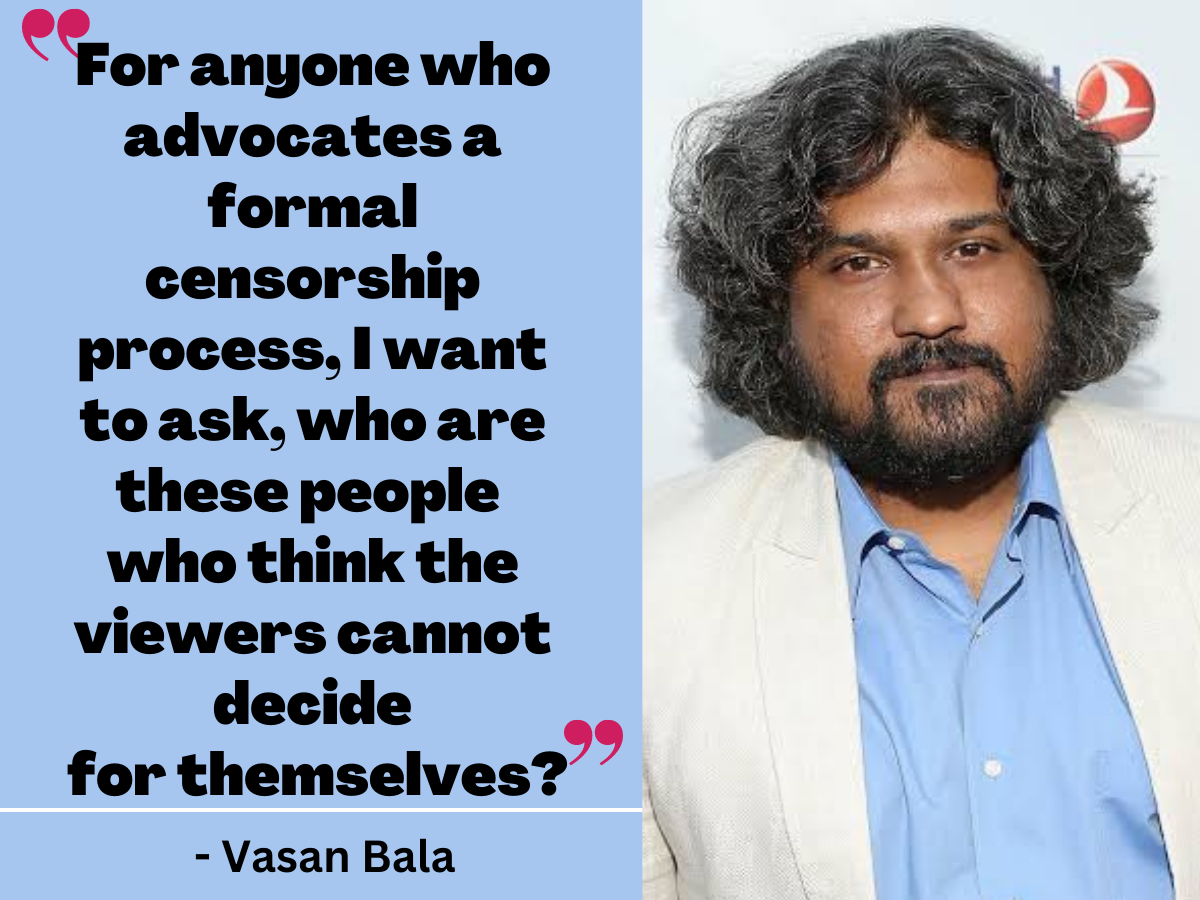
But there’s a cross section of the audience that is aggrieved and unhappy. While this section appreciates the convenience of OTT platforms it does not enjoy the fact that a some of the popular content on OTT is also obscene, vulgar and laden with expletives. Shows like Mirzapur have a high dose of violence and expletives, the recently release Rana Naidu, featuring Venkatesh and Rana Daggubati is high on obscenities and shock value. Even TVF’s College Romance, a show packaged as the quintessential retelling of naive, young romance has come in for criticism when it comes to the use of foul language. Platforms like ALT Balaji have shows like XXX: Uncensored and Gandi Baat. All this put together, makes the family audience of OTT feel uneasy.
Surely parents can’t watch this type of content in the company of their young children. Likewise, young adults can’t watch the edgy stuff in the presence of their parents. The liberal view towards this gross inconvenience is that, people should watch the content on their phones and avoid the ‘awkward situation’ completely. But then, there’s a counter argument that says some OTT shows go a little overboard in an attempt to shock and awe their audience. Thrills and spills can be created without crossing certain limits and antagonising a large section of the audience, which prefers clean family entertainment.
India’s I&B Minister, Anurag Thakur recently commented, “Abuse in the name of creativity will not be tolerated. The government is serious about the complaints of the increasing abusive and obscene content on OTT platforms. These platforms were given freedom for creativity, not obscenity. And when someone crosses a limit, then abusing, rudeness in the name of creativity cannot be accepted at all. Whatever necessary action needs to be taken on this, the government will not back down from it.”
In this week’s Big Story we look at the pros and cons of having an open, unregulated OTT space. We have experts weighing-in and commenting if a more formal system of censorship end up stifling the creative spark of OTT content. Read on….
What is the current status of censorship on OTT platforms in India?
Movies that are released in theatres have to obtain a certificate from the Central Board of Film Certification (CBFC). But OTT platforms don’t have to depend on a Government appointed body for certification or censorship. As of now, the OTT platforms give their content a self-evaluated certification. The platforms are required to display age-based content ratings for their shows and movies.
Where The Centre stands in this matter is pretty clear. The Government doesn’t want to impose rigid rules on censorship to OTT content. But they also don’t want the creative minds to go berserk with salacious entertainment. Therefore The Centre has recently instructed OTT platforms to not showcase any content which is prohibited under Indian law and threaten the sovereignty of the nation. Netflix, Prime, Sony Liv and other platforms are mandated to have a Grievance Officer based in India, for receiving and addressing all complaints regarding their content.
Two years ago, The Centre notified draft rules for OTT censorship, named as Information Technology (Guidelines for Intermediaries and Digital Media Ethics Code) Rules, 2021. These rules are still being debated upon and are open for criticism and suggestions from the general public.
Last year the Supreme Court of India had dismissed a petition seeking a new system of OTT censorship. A bench consisting of Chief Justice UU Lalit and Justice Bela M Trivedi had reportedly heard the plea filed by Mirzapur resident Sujeet Kumar Singh to set up a preview committee that would go through all forms of OTT content before it gets released The Court said such a process was not feasible.

Salman Khan put a spotlight on the problem
Salman Khan, who has always been a strong advocate of family entertainment, recently stirred up debates when he criticised the offensive content of some OTT shows and called for a censorship process. At an event, Salman had said, “I really think there should be censorship on the medium. All these vulgarity, nudity, gaali galoch (swearing) should stop.”
He went on to explain the reason behind the same and said, “Ab 15-16 saal ka bacche dekh sakte hain. Apko acha lagega apki choti se beti ye sab dekhe.. padhne ke bahane (15-16-year-olds can now watch this content on their phone. Would you like it if your young daughter watches it giving an excuse she is using the device to study). I just think the content should be checked on OTT. Jitna clean hoga content, utna behtar hoga viewership uski zyada hogi (the cleaner the content, it will be better and will also have a larger viewership).”
Salman had further elaborated, “Apne sab kuch kar lia… lovemaking, kissing, expose kar lia aur aap apne
building mein ghus rahe hai aur apka watchman aapka content dekh raha hai (You have done it all – love making, kissing and exposing in scenes. And when you enter your building, your watchman is watching the same). I just don’t think that’s right for security reasons. Also, we don’t need to do that. Hindustan mein rehte hai, thoda bahut theek hai lekin itna zyada beech mein ho gya tha. Ab jake thoda control mein aya hai (You don’t need to cross the boundary. We live in India. It was way too much before, finally, it has been curbed). Now, people have started working on a lot of good and decent content.”

Dr. Chandraprakash Dwivedi (director of Mohalla Assi and Samrat Prithviraj) feels self-censorship is the only absolute solution
Speaking to ETimes, Dr Chandraprakash Dwivedi revealed that the Indian constitution and existing laws have already made a fool proof system. Any additional censorship process or laws are not really required. He reasons, “Not just OTT censorship, I don’t believe in censorship at all. The Constitution has enough provisions to stop obscenity and anything that can divide and cause disharmony in society. There have been several committees made to look into the affairs of CBFC. But all those committees have not been able to do anything. The last committee was the Shyam Benegal committee.
I strongly believe that there has to be self-regulation. And if anybody goes beyond the constitution and violates it there are enough provisions to punish them. You don’t need more laws. Anybody can move the court. Or for that matter, the ministry can take the notice of it and do the needful.
What happens is that we shout all the time but don’t find a remedy for the issue. Who can stop the Government or Ministry of Information & Broadcasting from taking action against any big OTT platforms that are airing anti-national or anti-society content? The government has to be proactive and take action.
I have been a part of the CBFC. I always say that within the Constitution, there are enough provisions for freedom of speech with reasonable restraining. You do not have absolute freedom of speech. What people do not understand is that when you encroach into somebody else’s territory, that person also has freedom of speech. People think that this right is absolute. No, this right is not absolute. It has to have a restrain. That restraint is undefined. That’s why people go to court to define what is restrain.
Why did I go to Court and CBFC for Mohalla Assi? I went because CBFC would take a u-turn on things on which decisions were already made. Udta Punjab was one such case. Those who don’t want to hear objectionable stuff will walk out of the theatre. Who’s forcing them to sit in the theatre? Similarly, who is forcing you to watch something in your private space? I am not worried about cuss words or nudity or explicitly sexual content. My objection is to anything that causes a social rift, conflict, or disharmony and in no way are anti-national ideas acceptable.”
Pahlaj Nihalani feels OTT censorship is a must
Former CBFC Chief and producer of titles like Shola Aur Shabnam and Aankhen, Pahlaj Nihalani tells ETimes, “I think the censorship for OTT platforms is required. If you need a certificate for satellite then why not for OTT? And if you don’t need a certificate for OTT, then why do you need it for theatres? A film is a film. No matter where it releases it should be on a uniform level.
Language is a different thing. But there’s more nudity and obscenity and vulgarity in OTT content which might be more than that seen in Hollywood films. When I was the Chief of the CBFC, I was only following the guidelines. But there were some people who were not making movies, they were only trying to prove something by making noise. Things are allowed from all corners today and everybody has kept mum. The public has started creating noise and the matters are going to court. The government has awakened in this matter.
The media picked up the matter after Salman Khan said something about it. Why didn’t they do anything when the public was making the noise? When I was the CBFC Chief I had said that certification should be uniform across mediums. They wasted so much money on the Shyam Benegal Committee. But what happened to that committee? The court banned the trailer of Kya Kool Hain Hum, a franchise film after the public made some noise. A similar thing happened with Mohalla Assi. Even court decisions are different from one film to another. If you put self-regulation on OTT content then put the same on theatrical releases and if you’re certifying theatrical releases then certify OTT content too.”

Suparn Varma (director of The Family Man: Season 2 and Rana Naidu) feels there’s already a functional censorship process on OTT
Suparn Varma, who has made some of the most popular shows on OTT feels there’s already an effective censorship process on OTT which does not require an overhaul. He explains, “OTT censorship has always existed. There are SNP guidelines and lawyers going through every single script, keeping in line with all orders by the government so that nobody’s sensibilities are affected. And it’s been there for the longest time. Whether it’s cultural or political sensitivity, everything is taken into account. No creator makes something for the sake of controversy. It is only stated in the world they’re trying to create. So, there’s no need for anything extra because all the guidelines are already there. Every platform is following those guidelines. It’s not something new.”
Subhash Ghai feels artistes should be more responsible with their freedom
Subhash Ghai has moderate views on the subject of OTT censorship in light of the growing obscenity and abusive language in OTT shows and films. He says, “Yes, censorship is needed if we acknowledge that obscenity is offensive to Indian society at large. Any negativity shown in the name of ugly facts that rarely happen to the common public, may affect the sensitivity of innocent people in society.
Freedom of expression in any art craft should be interpreted as freedom with responsibility from artistes. Having said that, one has to acknowledge that negativity does disturb the peace of society at large. A nation and its culture must progress with divine and positive qualities to attain happiness. If the viewer isn’t happy or is dissatisfied, what is the point of the entertainment?”

Vasan Bala feels the average OTT viewer is sensitive and intelligent enough to make his/her own choices
Vasan Bala, who has recently made acclaimed projects like Cinema Marte Dum Tak and Monica O My Darling for OTT feels the audience can choose what is right for them without someone holding their hand. He explains, “There’s absolutely no need for OTT shows and movies to be reviewed by a censorship body. It’s a choice to click and access any content. No one is forcing anyone to either subscribe to the platform nor click on the content that makes them uncomfortable.
For anyone who advocates a formal censorship process, I want to ask, who are these people who think the viewers cannot decide for themselves? Younger audiences have been trying to access adult content forever, even when it was in a magazine format or VHS, DVDs, VCDs and then on the internet. Also people who are in their 40s and 50s now and want to be gatekeepers, was their curiosity and urge any different from any kid at that age?
People who take responsibility for their lives, their family, country, home, education etc can’t decide on their entertainment? It’s not possible to impose censorship diktats on an open medium like the internet.”